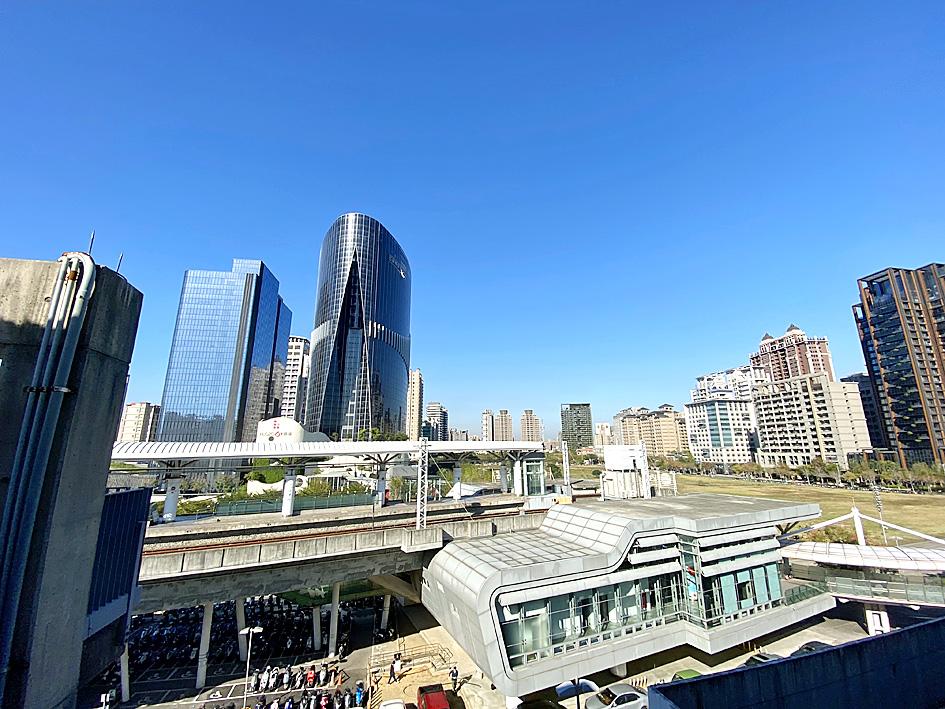Housing prices picked up nationwide last year, supported by an economic boom, excessive liquidity and low interest rates, but the population is shrinking, which is unfavorable for the property market in the long run, analysts said yesterday.
Taiwan’s population stood at 23,375,314 last year, contracting 1 percent, or 228,000, after mortality rates officially overtook birthrates in 2020.
The populations in the special municipalities of Taipei, New Taipei City, Taichung, Tainan and Kaohsiung declined by a combined total of 181,194, H&B Realty Co (住商不動產) said, citing Ministry of Interior data.

Photo: Hsu Yi-ping, Taipei Times
Taipei lost the most people at 118,484, followed by Kaohsiung (29,880), Tainan (18,157), New Taipei City (12,459) and Taichung (2,214), said H&B, the nation’s largest house broker by the number of franchises.
Taoyuan was the exception, with a 1 percent gain, or 21,437 people, it said.
However, the demographic changes did not hinder a rise in home prices, with increases of 18.5 percent in Tainan, 17.6 percent in Kaohsiung, 14.1 percent in Taichung, 7.7 percent in Taoyuan, 7 percent in Taipei and 5.4 percent in New Taipei City, H&B research head Jessica Hsu (徐佳馨) said.
“The price hikes last year challenge conventional beliefs that population is the most critical fundamental to gauge the property market and that population losses for any reasons bode ill for housing prices,” Hsu said in a report.
One explanation could be that Taiwan’s low fertility rate boosted the number of small households and supported real demand, Hsu said.
Despite the population decline, the number of households increased 1.9 percent to 9,006,580, she said.
The rise in the proportion of small families might also explain why two-bedroom apartments have become mainstream products, she said.
International reports show that people assign more importance to health and well-being amid the COVID-19 pandemic and are willing to live in less populous areas to avoid crowds, she said, adding that remote working has made migrating to suburban locations more feasible.
Global monetary easing has encouraged property purchases as a hedge against inflation, Hsu said.
Mandy Lang (郎美囡), lead researcher at Great Home Realty Co (大家房屋), said that an improving outlook for the job market in southern Taiwan has bolstered housing prices in Tainan and Kaohsiung.
Taiwan Semiconductor Manufacturing Co (台積電) facilities that are being built in the two cities have prompted developers to construct new residential complexes in the hope of selling them to TSMC employees, Lang said.
Cushman & Wakefield Taiwan managing director Billy Yen (顏炳立) said that housing prices in southern Taiwan have soared 30 percent following TSMC’s capacity expansion announcements.

Real estate agent and property developer JSL Construction & Development Co (愛山林) led the average compensation rankings among companies listed on the Taiwan Stock Exchange (TWSE) last year, while contract chipmaker Taiwan Semiconductor Manufacturing Co (TSMC, 台積電) finished 14th. JSL Construction paid its employees total average compensation of NT$4.78 million (US$159,701), down 13.5 percent from a year earlier, but still ahead of the most profitable listed tech giants, including TSMC, TWSE data showed. Last year, the average compensation (which includes salary, overtime, bonuses and allowances) paid by TSMC rose 21.6 percent to reach about NT$3.33 million, lifting its ranking by 10 notches

SEASONAL WEAKNESS: The combined revenue of the top 10 foundries fell 5.4%, but rush orders and China’s subsidies partially offset slowing demand Taiwan Semiconductor Manufacturing Co (TSMC, 台積電) further solidified its dominance in the global wafer foundry business in the first quarter of this year, remaining far ahead of its closest rival, Samsung Electronics Co, TrendForce Corp (集邦科技) said yesterday. TSMC posted US$25.52 billion in sales in the January-to-March period, down 5 percent from the previous quarter, but its market share rose from 67.1 percent the previous quarter to 67.6 percent, TrendForce said in a report. While smartphone-related wafer shipments declined in the first quarter due to seasonal factors, solid demand for artificial intelligence (AI) and high-performance computing (HPC) devices and urgent TV-related orders

Prices of gasoline and diesel products at domestic fuel stations are this week to rise NT$0.2 and NT$0.3 per liter respectively, after international crude oil prices increased last week, CPC Corp, Taiwan (台灣中油) and Formosa Petrochemical Corp (台塑石化) said yesterday. International crude oil prices last week snapped a two-week losing streak as the geopolitical situation between Russia and Ukraine turned increasingly tense, CPC said in a statement. News that some oil production facilities in Alberta, Canada, were shut down due to wildfires and that US-Iran nuclear talks made no progress also helped push oil prices to a significant weekly gain, Formosa said

MINERAL DIPLOMACY: The Chinese commerce ministry said it approved applications for the export of rare earths in a move that could help ease US-China trade tensions Chinese Vice Premier He Lifeng (何立峰) is today to meet a US delegation for talks in the UK, Beijing announced on Saturday amid a fragile truce in the trade dispute between the two powers. He is to visit the UK from yesterday to Friday at the invitation of the British government, the Chinese Ministry of Foreign Affairs said in a statement. He and US representatives are to cochair the first meeting of the US-China economic and trade consultation mechanism, it said. US President Donald Trump on Friday announced that a new round of trade talks with China would start in London beginning today,